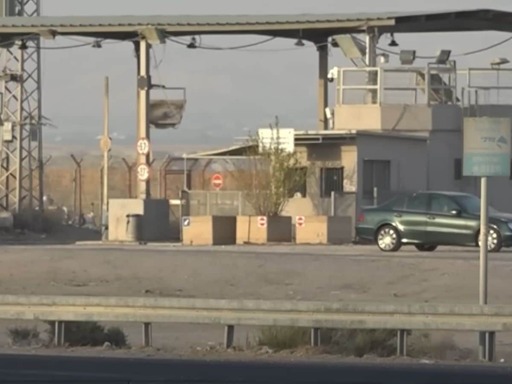The Israeli occupation indefinitely closed the Allenby Bridge border crossing – also called King Hussein Bridge or Karama Crossing – on Wednesday morning, 24 September, marking a significant heightening of tensions in the West Bank. Although it has been announced that passenger traffic will be allowed to cross once again, from Friday, the closure still deeply impacts over three million Palestinians in the occupied West Bank.
Closure of Karama Crossing between Jordan and West Bank ‘collective punishment’
Karama is the only land crossing between the occupied West Bank and Jordan, and is vital for Palestinians. It not only allows international travel and family visits- because the Israeli occupation’s restrictions severely limit their travel through Israeli airports, but is the only route for the transport of commercial goods between Jordan and the West Bank, and aids Gaza via humanitarian convoys. The Palestinian Ministry of Foreign Affairs and Expatriates has called its closure an “unjustifiable” act of “collective punishment”.
The closure follows an incident last week in which a Jordanian truck driver transporting humanitarian aid to Gaza opened fire at the occupation’s soldiers stationed at the crossing, killing two of them. The Israeli occupation responded by temporarily closing the border, then fully and indefinitely shutting it down from Wednesday morning, 24 September, without specifying a reopening date.
This crossing is critical for Palestinians as it is the only international gateway from the West Bank that does not require passing through Israeli territory, and is the only route for goods to enter and leave the West Bank.
In a statement on 25 September, Palestine’s Ministry of National Economy called the decision to close the Karama border “arbitrary”, and warned of serious economic, social, and humanitarian repercussions.
The occupation is tightening its control
The decision to reopen the Karama Crossing for pedestrians tomorrow will be welcome news for the thousands of Palestinians left stranded, but the economic and humanitarian implications are grave, as the flow of goods is halted, making worse an already fragile economy in the West Bank, and a desperate humanitarian situation in Gaza, especially as the Zikim crossing in the North of Gaza has been closed since 12 September, severely limiting aid getting to the north.
The occupation is tightening its control over the occupied West Bank. While some coalition members are pressuring for annexation of the territory, Palestinians believe the Karama border closure coincides with growing international recognition of the State of Palestine, which seems to have prompted a hardening Israeli response.
Netanyahu has publicly rejected the idea of a Palestinian state and to enforce this idea he has recently approved the E1 Settlement Plan, a project that will completely split the occupied West Bank in two and separate East Jerusalem from the rest of the territory.
Since the start of the Israeli occupation’s genocide in Gaza there has also been a significant surge in the number of movement obstacles in the West Bank, including military checkpoints, isolating communities, and controlling the population.
Around 1,000 Palestinians have been killed by the occupation since October 2023, while mass arrests, home demolitions, and forcible displacement due to settler attacks and access restrictions have further fragmented Palestinian society.
Featured image via the Canary
By Charlie Jaay
From Canary via this RSS feed


